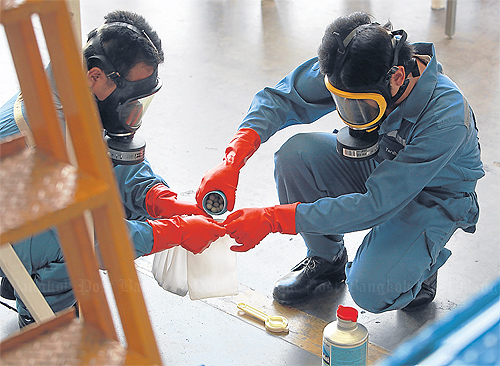The question has gripped a nation of nervous rice consumers: Is the pesticide methyl bromide used in rice storage safe for people to ingest?

Staff at a rice packing factory in Ayutthaya’s Nakhon Luang district prepare methyl bromide to fumigate rice. (Photo by Tawatchai Kemgumnerd)
Even though the gas has been used for decades as an industrial fumigant for stored farm products, particularly at mills for grains, the issue was put firmly in the spotlight after a survey of packed rice by the Foundation for Consumers (FFC) and BioThai Foundation found various levels of inorganic bromide or bromide ion residues in 34 brands out of 46 samples.
According to the lab test, almost all of the "tainted" products contained residues that were below the Codex safety limit of 50 milligrammes per kilogramme. Only one brand, Co-co (pimpa white rice) was found to have exceeded the limit at 67.4 mg/kg.

Despite being a leading rice producer and global exporter, Thailand has never set a limit for inorganic bromide residues.
The FFC's test showed that none of the packed rice samples contained fungicide or residues of organophosphate and carbamate pesticides.
Even though the test results were largely encouraging, the release last week triggered health concerns among millions of rice consumers in the country.
FFC secretary-general Saree Aongsomwang and BioThai director Witoon Lianchamroon called on the government to urgently inspect rice for bromide residues "to protect the health of consumers".
The fear has spread to the point that Prime Minister Yingluck Shinawatra tasted steamed rice in front of a media scrum to ensure its safety. Also, Thai Packed Rice Association president Somkiat Makkcayathorn offered to give 20 million baht to relatives of whoever could be proven to have died from methyl bromide poisoning by eating rice.
Food and Agriculture Organisation (FAO) assistant director-general Hiroyuki Konuma, who is also the regional representative for Asia and the Pacific, said last week the food safety issue is related to rice being stockpiled for too long.
He said he assumed the majority of rice may be stored for longer than the standard period of six months to a year. Thailand started to put rice from its pledging programme in warehouses two years ago.
The FAO's manual of fumigation states for insect control, repeated fumigation could cause an increase in residue with each treatment.
"Cereal grains given repeated treatments with methyl bromide were found to contain increasingly higher levels of inorganic bromide both in the whole grains and in the flour milled from them," the manual states.
Prokchol Ousap, a coordinator at BioThai, said a lack of studies on health risks caused by consuming food tainted with chemical residues could fuel the concern. Most studies are on health risks caused by direct exposure to the gas among fumigation staff.
An academic, who asked to remain anonymous, said the fumigant was not an issue in the past since rice traders kept rice grains in hemp sacks which allowed the gas to dissipate better.
Nowadays, most rice traders pack rice in plastic bags which could block dissipation, she said. It takes about one day for methyl bromide contamination to dissipate into the air.
FAO senior food safety and nutrition officer Shashi Sareen said if traders follow proper practices, there should be no problem.
Bureau of Quality and Safety of Food director Laddawan Rojanapantip urged consumers not to panic about the so-called methyl bromide contamination. She said the fumigant, if any is left, will dissipate once the bag is open.
More importantly, methyl bromide is sensitive to temperatures starting from as low as 3C. This means it evaporates as soon as it comes into contact with room temperature and should not be an issue for a tropical country like Thailand, she said. Any more that clings to the grains will disappear through the rice cooking process.
"If there's any fumigation residue left, it will definitely be washed away when you rinse the grains and cook it at 100C," Ms Laddawan said.
She also cited a guideline by the World Health Organisation, which stated that a daily intake of 1mg of bromide residue per kilogramme of someone's body weight is considered safe.
If you weigh 50kg, you may take up to 50mg of bromide residue a day. If you happen to weigh 67.4kg, you may safely consume 1kg of Co-co (pimpa white rice) every day, she said.